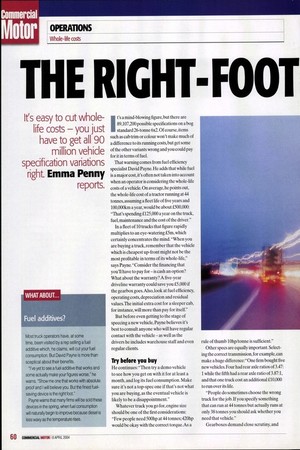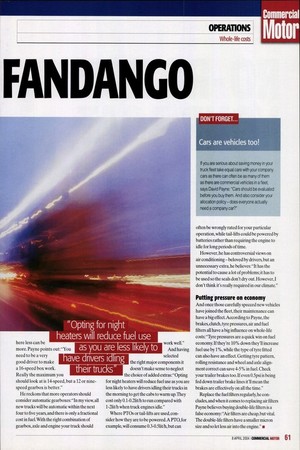THE R GHT FOOT
Page 60

Page 61

If you've noticed an error in this article please click here to report it so we can fix it.
FANDANGO
It's easy to cut whole life costs — you just have to get all 90 million vehicle specification variations right Emma Penny
reports.
It's a mind-blowing figure, but there are 89,107,200 possible specifications on a bog standard 26-tonne 6x2. Of course, items such as cab trim or colour won't make much of a difference to its running costs, but get some of the other variants wrong and you could pay for it in terms of fuel.
That warning comes from fuel efficiency specialist David Payne. He adds that while fuel is a major cost, it's often not taken into account when an operator is considering the whole-life costs of a vehicle. On average, he points out, the whole-life cost of a tractor running at 44 tonnes, assuming a fleet life of five years and 100,000km a year, would be about £500,000: "That's spending £125,000 a year on the truck, fuel, maintenance and the cost of the driver."
In a fleet of 10 trucks that figure rapidly multiplies to an eye-watering Om, which certainly concentrates the mind. "When you are buying a truck, remember that the vehicle which is cheapest up-front might not be the most profitable in terms of its whole-life," says Payne. "Consider the financing that you'll have to pay for — is cash an option? What about the warranty? A five-year driveline warranty could save you £5,000 if the gearbox goes. Also, look at fuel efficiency, operating costs, depreciation and residual values. The initial extra cost for a sleeper cab, for instance, will more than pay for itself."
But before even getting to the stage of speccing a new vehicle, Payne believes it's best to consult anyone who will have regular contact with the vehicle — as well as the drivers he includes warehouse staff and even regular clients. Try before you buy
He continues: "Then try a demo vehicle to see how you get on with it for at least a month, and log its fuel consumption. Make sure it's not a top-spec one if that's not what you are buying, as the eventual vehicle is likely to be a disappointment." Whatever truck you go for, engine size should be one of the first considerations: "Few people need 500hp at 44 tonnes; 420hp would be okay with the correct torque. As a
rule of thumb 10hp/tonne is sufficient."
Other specs are equally important. Selecting the correct transmission, for example, can make a huge difference: "One firm bought five new vehicles. Four had rear axle ratios of 3.47: 1 while the fifth had a rear axle ratio of 3.87:1, and that one truck cost an additional £10,000 to run over its life.
"People do sometimes choose the wrong truck for the job. If you specify something that can run at 44 tonnes but actually runs at only 38 tonnes you should ask whether you need that vehicle." Gearboxes demand close scrutiny, and here less can be more. Payne points out: "You
need to be a very good driver to make a 16-speed box work. Really the maximum you
should look at is 14-speed, but a 12 or ninespeed gearbox is better." He reckons that more operators should consider automatic gearboxes: "In my view, all new trucks will be automatic within the next four to five years, and there is only a fractional cost in fuel, With the right combination of gearbox, axle and engine your truck should
work well." And having selected the right major components it doesn't make sense to neglect the choice of added extras: "Opting
for night heaters will reduce fuel use as you are less likely to have drivers idling their trucks in the morning to get the cabs to warm up.They cost only 0.1-0.21it/h to run compared with 1-21it/h when truck engines idle." Where PTOs or tail-lifts are used, consider how they are to be powered.A PTO, for example, will consume 0.3-0.51it/h, but can
often be wrongly rated for your particular operation, while tail-lifts could be powered by batteries rather than requiring the engine to idle for long periods of time.
However, he has controversial views on air conditioning-beloved by drivers, but an unnecessary extra, he believes: "It has the potential to cause a lot of problems; it has to be used so the seals don't dry out. However, I don't think it's really required in our climate." Putting pressure on economy
And once those carefully specced new vehicles have joined the fleet, their maintenance can have a big effect.According to Payne, the brakes, clutch, tyre pressures, air and fuel filters all have a big influence on whole-life costs: "Tyre pressures are a quick win on fuel economy. If they're 10% down they'll increase fuel use by 1%, while the type of tyre fitted can also have an effect. Getting tyre pattern, rolling resistance and wheel and axle alignment correct can save 4-5% in fuel. Check your trailer brakes too. If even 0.5psi is being fed down trailer brake lines it'll mean the brakes are effectively on all the time." Replace the fuel filters regularly, he concludes, and when it comes to replacing air filters Payne believes buying double-life filters is a false economy: "Air filters are cheap, but vital. The double-life filters have a smaller micron size and so let less air into the engine." •
Fuel additives?
Most truck operators have, at some
time, been visited by a rep selling a fuel additive which, he claims, will cut your fuel consumption. But David Payne is more than sceptical about their benefits.
"I've yet to see a fuel additive that works and some actually make your figures worse," he warns. "Show me one that works with absolute proof and I will believe you. But the finest fuelsaving device is the right foot."
Payne warns that many firms will be sold these devices in the spring, when fuel consumption will naturally begin to improve because diesel is less waxy as the temperature rises.
If you are serious about saving money in your truck fleet take equal care with your company cars as there can often be as many of them as there are commercial vehicles in a fleet, says David Payne: "Cars should be evaluated before you buy them. And also consider your allocation policy does everyone actually need a company car?"






































































































